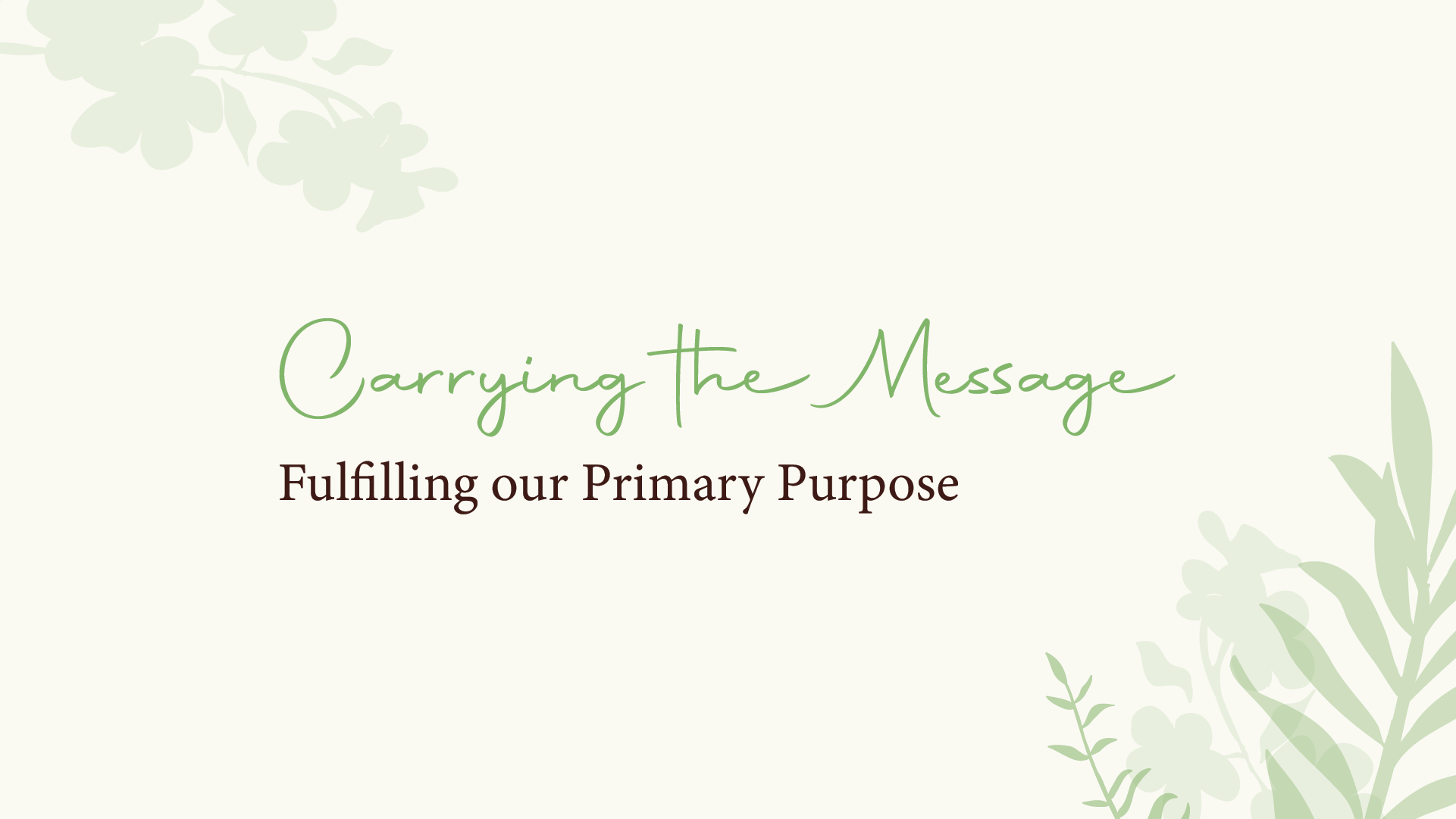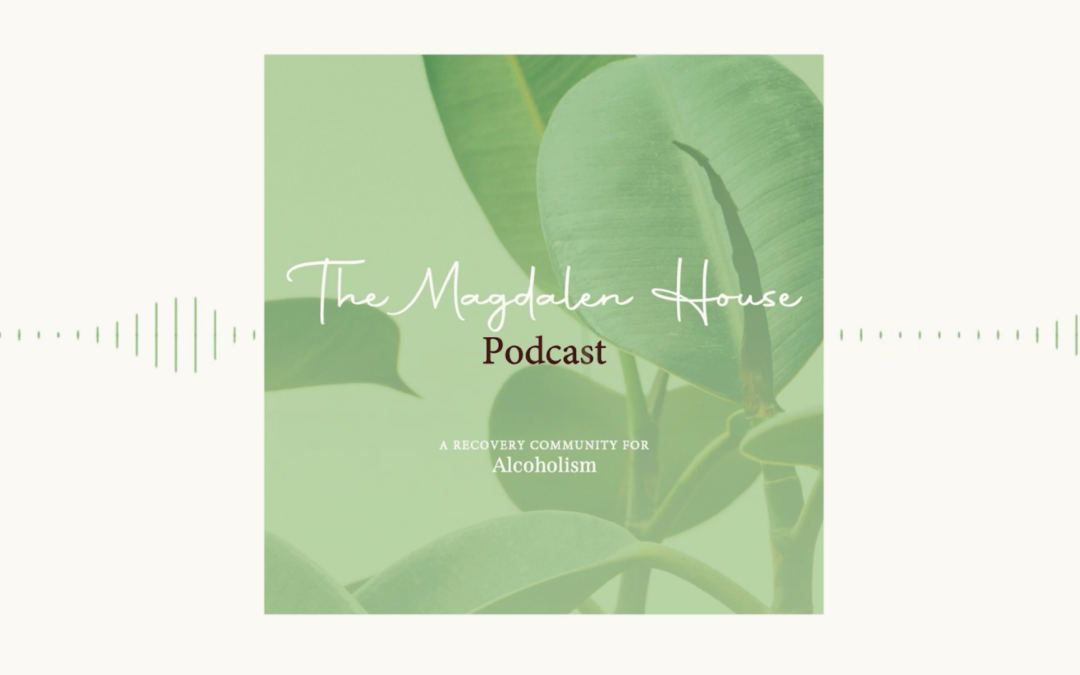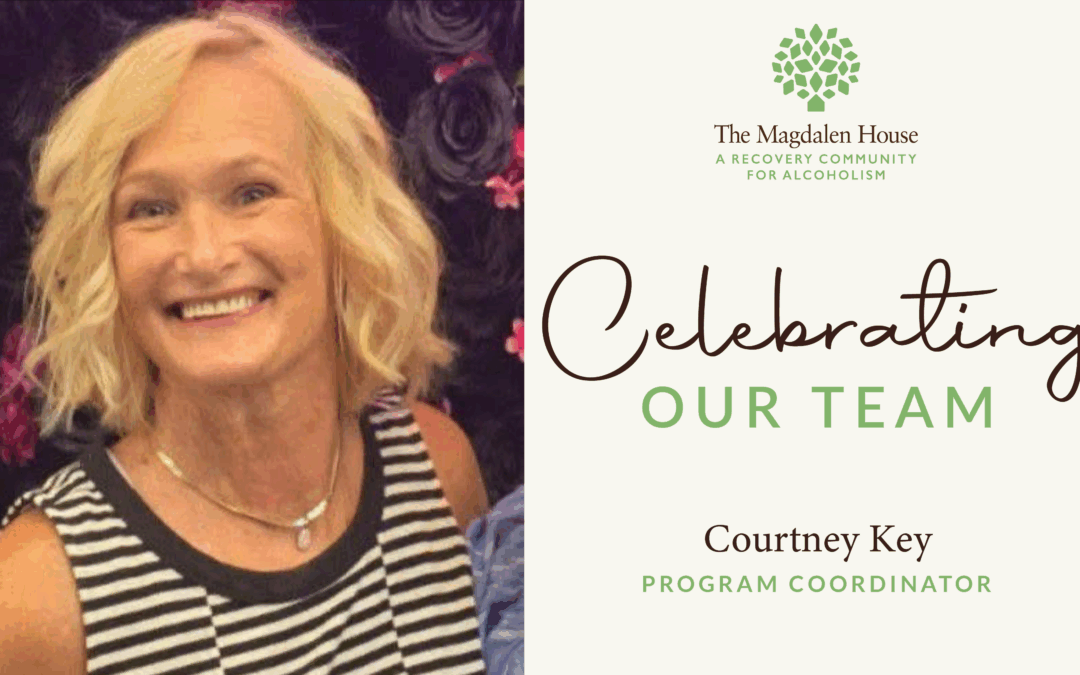Carrying the Message: Fulfilling our Primary Purpose
By Kate Eimer, Program Coordinator
As a recovered alcoholic, I can joyfully share that the ultimate promise of the program has manifested in my life—I have had a spiritual awakening as the result of working the steps. Our book qualifies a spiritual awakening as
“the personality change sufficient to bring about recovery from alcoholism”
— Alcoholics Anonymous, 2002, (p. 567.)
In other words, it is the “psychic change” (p. xxix) described in the chapter “There is a Solution,” whereby “huge emotional displacements and rearrangements” (p. 27) occur in the individual. This spiritual awakening has, and continues to, transform my attitude “toward life, toward my fellows, and toward God’s universe” (p. 25). It allows me to stay rooted in the truth of this disease and gives me but one primary purpose:
“to carry this message to the alcoholic who still suffers” (p. 563).
As recovered alcoholics, our primary purpose of carrying this message to the alcoholic who still suffers is the same as the first point of action in Step 12:
“…we tried to carry this message to alcoholics…” (p. 60.)
Let’s break this down into significant parts.
It should be helpful to briefly explain what alcoholism is and what qualifies the alcoholic individual, since this is the person to whom we carry this message. Alcoholism is an illness of the body and mind. Our bodies react differently to alcohol, for when we ingest alcohol, we develop a craving for more beyond our control. Additionally, our minds are obsessed with the effects produced by alcohol. We have a mental illness that disqualifies our willpower and leaves us with no defense against taking the first drink. We have effectively “…lost the power of choice in drink” (p. 24). When I try to carry this message to alcoholics, I am looking for people who are suffering from this “seemingly hopeless state of mind and body” (p. xiii). Additionally, as an ex-problem drinker, I have come to understand that I am uniquely qualified to be helpful to other alcoholics who are still suffering.
Step 12 and our primary purpose tell us to “carry this message.” What message are we talking about? It is the message contained in the text of Alcoholics Anonymous. It is the truth about the illness of alcoholism and the solution we have found. I do not narrate my opinion or promote my personal beliefs when I carry the message. Like the authors of our text, I stick to the facts about alcoholism, explain the clear-cut directions provided in this program of recovery, and share my experience with finding the solution offered. It is essential to emphasize this to avoid convoluting the truth or creating folklore around the topic.
If my duty is to carry this message to alcoholics, and I am uniquely capable of doing so, how do I find them? Notice how Step 12 asks us to “carry this message.” Carry is an action word! I will not be able to find alcoholics to help unless I am willing to take the action to go out into the world and find them. It may be the case that you know individuals suffering from this illness, considering 662,000 people in the Dallas Fort-Worth area alone are alcoholic. Perhaps you don’t know someone, or it may not be appropriate to approach the individual on these terms now. Our text tells us that you can easily find them by “…asking a few doctors, ministers, priests, or hospitals” (p. 89). I have formally found alcoholics to carry the message through my Twelfth Step commitment at a local hospital, as well as through staying active in my home group and being present for newcomers and others at our weekly gatherings. I have also found that as I live life out loud as a recovered alcoholic, with the spirit of attraction rather than promotion, I have made connections with alcoholics in informal ways.
A final point of emphasis in this concept is on the word “tried.” Step 12 doesn’t say we will deliver a message to open ears; it says, “We tried to carry this message to alcoholics.” I will give my very best effort to share my experience and knowledge with this message, but I am removed from the results of my efforts. I understand that,
“…no human power could have relieved our alcoholism” (p. 60).
The main point is that I take action to uphold my duty as a recovered alcoholic, something I agreed I would do when I took Step 3 and something I intend to remain willing to do for the rest of my life.
I share with honesty and enthusiasm that there is no feeling like the one I get when I carry this message today. There is a sense of pleasure and peace that equally overcomes me. I feel a great sense of responsibility to pass along what I have learned to others who want and need it badly, for it just so happened that someone else freely did this for me. It wasn’t until I truly heard this message from someone who was once just like me that I came to comprehend what I was suffering from. It was only from this point that I was certain of my truth and was willing to go to any lengths for victory over alcohol. One of the co-founders of Alcoholics Anonymous puts it best in the chapter “Dr. Bob’s Nightmare” (pp. 180-181):
“I do it for four reasons:
- Sense of duty.
- It is a pleasure.
- Because in so doing, I am paying my debt to the man who took the time to pass it on to me.
- Because every time I do it, I take out a little more insurance for myself against a possible slip.”
It is true that “nothing will so much ensure immunity from drinking as intensive work with other alcoholics” (p. 89). It is through “work and self-sacrifice for others” (p. 15) that I stay recovered from the illness of alcoholism. This starts with trying to carry this message to alcoholics who are still suffering, no matter the effort required.
Alcoholics Anonymous: The story of how many thousands of men and women have recovered from alcoholism. (4th ed.). (2001). Alcoholics Anonymous World Services.





